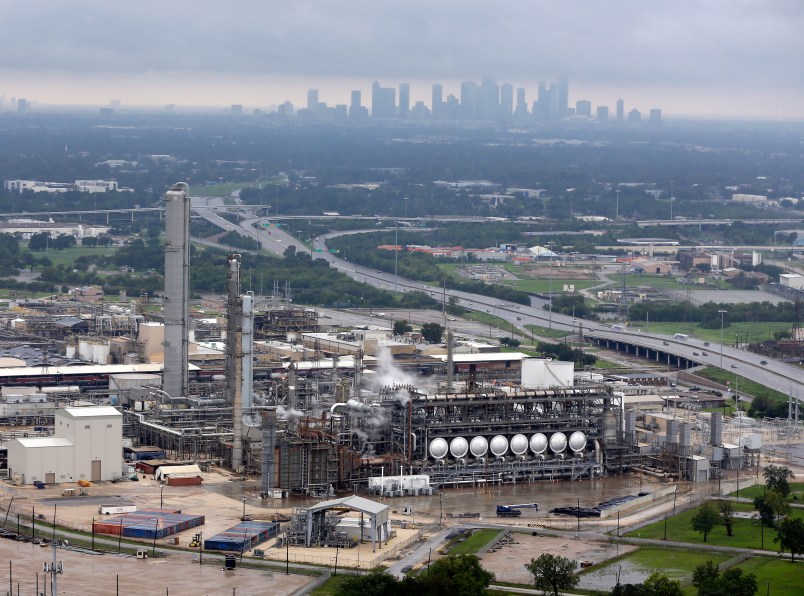DALLAS (AP) — Hurricane Harvey is sending pump prices higher for U.S. motorists and causing temporary shifts in the flow of oil and gasoline around the world after taking down a huge chunk of U.S. refining capacity.
It will be days or even weeks before the energy sector in the southeast Texas Gulf Coast is back to normal operations as it deals with flooding in the aftermath of Harvey, which has been downgraded to a tropical storm. The region from Corpus Christi, Texas, where Harvey made landfall, to the Louisiana state line accounts for about 3 percent of the U.S. economy and is a crucial export market for oil and chemicals.
Wednesday brought news that the nation’s biggest refinery, which was already running below half-speed, had begun a complete shutdown. The Motiva Enterprises plant in Port Arthur, Texas, run by a unit of the state-owned oil company of Saudi Arabia, was the latest domino to fall among Gulf Coast refineries.
More than one-fifth of U.S. refining capacity has been shuttered, according to S&P Global Platts.
With that, gasoline futures headed higher for a third straight day. They had climbed 10 cents to $1.88 a gallon Wednesday
Retail gas prices climbed, too, up 2 cents a gallon on Wednesday and 7 cents in the past week, to a national average price of $2.42 per gallon, according to Gasbuddy.
“In terms of product price increases, it might get worse before it gets better,” said Rob Smith, an energy analyst with IHS Markit.
It could take two weeks or longer before big refineries in the Houston area can recover from a record-setting deluge and resume normal operations. That assumes they didn’t suffer serious damage, which is still unknown.
Harvey isn’t the first big storm to hit the refinery-rich Gulf Coast, but the oil industry has undergone big changes since the last major interruption from Hurricane Ike in 2008.
The so-called shale revolution has led to a surge in oil production in the U.S., increasing the nation’s exports of crude oil and gasoline to Mexico and other places in Latin America, and diesel to Europe.
When the U.S. can’t produce enough gasoline or diesel to meet export demands, other regions are forced to look for replacement supplies “and the backfill has to come from further away,” said Richard Joswick, an analyst with S&P Global Platts. “It has to come from Asia even.”
The result will be higher prices, but it should be just a one- or two-week problem, Joswick said.
Patrick DeHaan, an analyst for GasBuddy, predicts that U.S. gasoline prices will top out around $2.50 or $2.55 a gallon, an increase of up to 20 cents since Harvey hit, with bigger spikes closer to the Gulf.
The recovery from Harvey will mimic the storm’s path from west to east. Flint Hill Resources’ refinery in Corpus Christi, where Harvey made landfall as a Category 4 hurricane, could begin to restart — a process that takes days — as early as Wednesday. Other refineries in the area are likely to do the same later this week.
“It takes some time to start up a refinery under normal circumstances, and it wouldn’t be surprising if they run into hiccups,” said Smith, the HIS Markit analyst. “It could be a week if not longer before Corpus Christi is at normal operations.”
Exxon, Shell and other companies have reported to Texas regulators that some of their storage tanks and other facilities near Houston were damaged by the torrential rains and flooding. Most of the reports seem to indicate relatively minor damage, but still it could be days before crews can assess matters and make repairs.
Even once the refineries are running, pipelines and ports are needed to carry their gasoline, diesel and other fuels to consumers.
A major pipeline supplying the East Coast with gasoline remains shut down — partly because with refineries closed, there is nothing to ship, but also because of damage in at least three areas. Another pipeline that carries crude from the big Permian Basin field in Texas to Houston-area refineries is also closed.
Other sectors are also slowly emerging from Harvey’s mess.
—INSURANCE: Damage estimates from wind, storm surges and flooding are soaring, with Moody’s Analytics putting them between $51 billion and $75 billion. RMS, a company that advises insurers, estimates the cost at $70 billion to $90 billion. TD Economics said Harvey will cut 0.1 to 0.4 points from U.S. third-quarter economic growth.
— SHIPPING: In a hopeful sign, port officials in Corpus Christi say that an initial check turned up some damage from Harvey’s landfall over the weekend, but they hope to restart shipping on Monday. First, however, the Coast Guard will have to declare the shipping lanes clear, and boat pilots will have to be satisfied it’s safe.
All four ports in the Houston area remain closed and aren’t likely to reopen for several days.
— TRAVEL: Houston Mayor Sylvester Turner said Houston’s two airports would resume limited service late Wednesday afternoon.
United Airlines planned to operate three departures and three arrivals Wednesday night at Bush Intercontinental Airport, a spokesman said. Other carriers, such as American Airlines, planned to wait until Thursday. At Hobby Airport, Southwest Airlines, the dominant carrier, doesn’t plan any flights before Saturday, according to a spokeswoman.
More than 1,600 U.S. flights had been canceled by afternoon, most of them at the Houston airports, according to tracking service FlightAware.







This wasn’t true, of course, but what a difference less than two months make, huh?
Is this more proof of Rick Wilson’s *ETTD Law?
*Everything Trump Touches Dies.
20 cents a gallon doesn’t seem like a lot to me.
Hope this is wrong